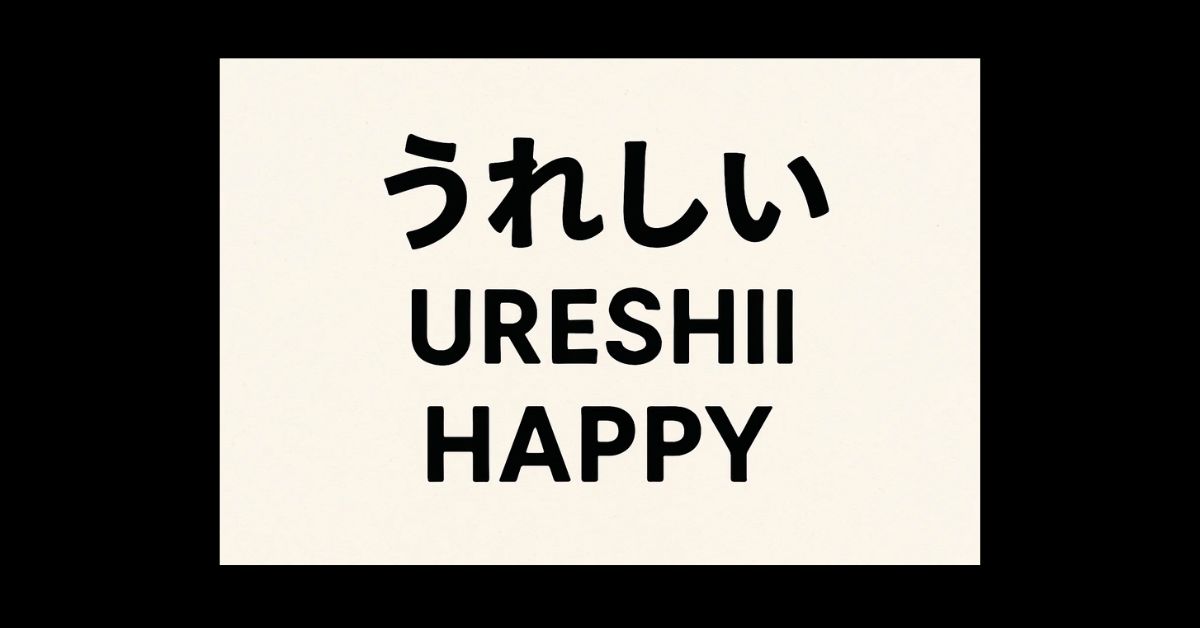Ureshii meaning in Japanese is all about feeling happy or glad in a special, open way. When someone says ureshii (嬉しい), they are stating joy about something that just happened like getting a gift or hearing good news. It’s a common word in everyday Japanese and helps show your true feelings in a civil and natural way.
Whereas more deep words like shiawase or fun words like tanoshii fit better for the better-off, heartier moments, Japanese ureshii is ideal for those lighter, heartfelt ones. Studying words like ureshii allows learners to grasp Japanese open faces and how Japanese feelings are stated better. It’s also helpful for anyone making the JLPT N5 or having open scenes in anime to watch.
What Does Ureshii Mean? Your Guide to Japanese Joy
Ureshii, which means you’re happy, glad, or happy in Japanese, is a way to fast your feeling of open joy about something that happened. It’s the kind of word you use when you feel a big, warm, happy feeling such as receiving approval, seeing a friend, or receiving good news.
Ureshii is an i-adjective (嬉しい) that keeps looking in regular Japanese and anime, so it’s easy to recognize and memorize. For anyone studying Japanese open language, this word is a superb place to start.What is so unique about ureshii in Japanese is the way it states individual joy in a polite and natural style.
While other words such as shiawase (heartfelt satisfaction) or tanoshii (enjoyment) do not suit the little but happy moments, ureshii does. It is used in everyday life, so it is a must for travelers and learners alike. If you are active in the JLPT N5 or watching J-dramas, this word will really bring a feeling to your language.
Ureshii definition in a word: joy you skill when something nice happens to you.
How Ureshii Differs From Other Japanese Words For Happiness
To really know the ureshii meaning, it helps to see how it’s different from other ways to say “happy” in Japanese.Comparing ureshii with similar words gives you a clearer picture of Japanese open words.
Ureshii (嬉しい) vs. Shiawase (幸せ)
Ureshii meaning refers to being happy due to a particular moment, such as receiving good news or a personal sign. Shiawase, however, refers to a deeper, longer-term pleasure more of being really satisfied with life. Although both words reflect Japanese emotional feelings, ureshii is more the happiness you skill at the second.
Example:
Ureshii: 合格の知らせを聞いて嬉しいです。
Goukaku no shirase wo kiite ureshii desu.
“I’m happy to hear I passed the exam.”
Shiawase: 家族と一緒にいると幸せです。
Kazoku to issho ni iru to shiawase desu.
“I feel happy when I’m with my family.”
Ureshii (嬉しい) vs. Tanoshii (楽しい)
Ureshii meaning is the happiness you feel from something open such as getting a gift or seeing a friend. Tanoshii, however, means something is enjoyable or fun, such as an activity or event. Although both are pleasant, ureshii in Japanese refers to central happiness, and tanoshii refers to external skills you find pleasure in.
Examples:
Ureshii: プレゼントをもらって嬉しいです。
Purezento wo moratte ureshii desu.
“I’m happy to receive this gift.”
Tanoshii: この映画は楽しいです。
Kono eiga wa tanoshii desu.
“This movie is fun.
Ureshii (嬉しい) vs. Yorokobi (喜び)
Ureshii means plain, ordinary happiness you skill in the moment such as meeting a friend or receiving good news. Yorokobi means a deeper or formal type of joy, usually used in writing or particular settings. Although ureshii in Japanese is informal and close, yorokobi feels stronger or open in a polite style.
Examples:
Ureshii: 友達に会えて嬉しいです。
Tomodachi ni aete ureshii desu.
“I’m happy to see my friend.”
Yorokobi: 彼女の成功は私たちの喜びです。
Kanojo no seikou wa watashitachi no yorokobi desu.
“Her success is our joy.”
Common Uses of Ureshii in Everyday Japanese
Knowing the ureshii meaning in real-life situations helps Japanese learners speak more indeed. Here are some everyday moments where saying ureshii feels just right:
1. Receiving Gifts or Favors
When someone gives you a present or does something nice for you, using ureshii is a natural way to show your happiness and thankfulness.
Example:
プレゼントをもらって嬉しいです。
Purezento wo moratte ureshii desu.
“I’m happy to receive this gift!”
2. Meeting Someone
When you meet a friend or loved one after a while, saying ureshii shows your open happiness in a warm, friendly way.
Example:
久しぶりに会えて嬉しいです。
Hisashiburi ni aete ureshii desu.
“I’m happy to see you after such a long time.”
3. Hearing Good News
When you receive positive or moving news like someone passing an exam, ureshii is the perfect word to fast your joy.
Example:
合格したと聞いて嬉しいです。
Goukaku shita to kiite ureshii desu.
“I’m happy to hear that you passed the exam.”
4. Compliments and Recognition
When someone respects you or knows your efforts, saying ureshii shows that you truly grow and feel happy inside.
Example:
褒められて嬉しいです。
Homerarete ureshii desu.
“I’m happy to be praised.”
Want to explore Japan’s culture?
If you’re attentive in Japanese culture, studying words like ureshii provides you with a better sense of the emotion. The ureshii definition is more than “happy” and shows how people grow and share pleasure civilly, warmly, and respectfully in Japan. You find yourself hearing ureshii frequently in Japanese television shows, chat, and everyday moments that host small, open happiness.
Ureshii Grammar and Usage Tips
To fully know the ureshii meaning, it’s important to know how to use ureshii in Japanese rulings. Since it’s an i-adjective, it follows even patterns for changing tense or making it bad.
Basic Form
The basic form of ureshii is 嬉しい (うれしい). Since it’s an i-adjective, it changes just like other even adjectives in Japanese.
Past Tense
嬉しかったです。
Ureshikatta desu.
“I was happy.”
Negative Form
嬉しくないです。
Ureshiku nai desu.
“I’m not happy.”
Casual Speech
めっちゃ嬉しい!
Meccha ureshii!
“So happy!” (casual)
By studying these buildings, Japanese students can apply ureshii freely both in well-mannered and informal speech. Whether you’re chatting with friends, writing a diary, or studying for the JLPT N5, becoming aware of the grammar of the meaning of ureshii makes your Japanese flatter and richer. It’s an effective means to join emotion and speak surely.
Cultural Context: Understanding Ureshii in Japanese Society
Ureshii’s meaning is more than simply “I’m happy” because it captures the way feelings are tactfully uttered in Japanese culture. In Japan, beings tend not to display deep feelings directly, so ureshii kind of delivers a polite and smooth means of stating happiness. Whether you’re happy at seeing another person or hearing good news, ureshii in Japanese allows that feeling to be sent in a soft, respectful manner. It’s a central aspect of daily chats and shows open linking without being too overt.
Balance and agreement are valued in Japanese people, even in feelings. Expressing ureshii allows you to express happiness without being overly loud or arrogant. You can hear it regularly in anime, drama, or everyday life, proving how people value the little things. Knowing the ureshii meaning enables learners to learn the language naturally as well as value cultural societies regarding message and feelings.
Tips for Learning and Remembering Ureshii
It becomes more open to learn the ureshii meaning when you relate it with things you love and utilize daily. These easy and playful tips will help you in remembering ureshii in Japanese and using it yourself in your day-to-day chat.
- Make association cards – Relate ureshii with your own cheerful memories to create strong mental families.
- Practice with example sentences – Write or utter short sentences using ureshii in order to be familiarized with actual usage.
- Watch for it in anime and J-dramas – Pay attention to how types say ureshii during open or glad moments.
- Use it in daily journal entries – Fast what makes you feel ureshii each day in order to further engrave on your memory as well as in writing.
- Say it out loud often – Repeating ureshii helps in articulation and builds speaking coolness.
- How is it different from other happy words – Know how ureshii meaning differs from tanoshii and shiawase for a clear understanding.
Q&A About Ureshii Meaning
What exactly does ureshii mean in Japanese?
Ureshii means “happy” or “glad” in Japanese. It shows personal joy in response to exact events or good news.
When should I use ureshii instead of other happiness words?
Use ureshii for open happiness caused by exact things, not general fun (tanoshii) or deep contentment (shiawase).
Can ureshii be used in formal situations?
Yes, ureshii is fine in formal speech when followed by “desu.” It’s polite and common in work or social settings.
Is ureshii only used for major events?
No, ureshii is also used for small happy moments like respects, gifts, or meeting someone after a while.
How do I pronounce ureshii correctly?
Say it as “oo-reh-shee.” Highlight the middle “reh” sound and give the “shii” slightly at the end.
What is the difference between Tanoshii and Ureshii?
Tanoshii means fun or enjoyable, while ureshii expresses open happiness from events that for myself matter to you.
How do you express happiness in Japanese?
You can say ureshii, tanoshii, or shiawase depending on the state each shows unlike levels of gladness or joy.
Conclusion: Mastering the Ureshii Meaning
Knowing the ureshii meaning makes you speak Japanese more indeed and relate to the culture better. This little but potent word allows you to say things from the heart and make chats more open. Be it making the JLPT N5 or wanting to improve your Japanese, having an idea of how to use ureshii makes learning more pleasant and worthwhile.
To expand your open language, have a look at our guides to saying “strong” or “cute” in Japanese. Briefly, the ureshii meaning is the happy emotion you feel when something lovely follows just for you.

